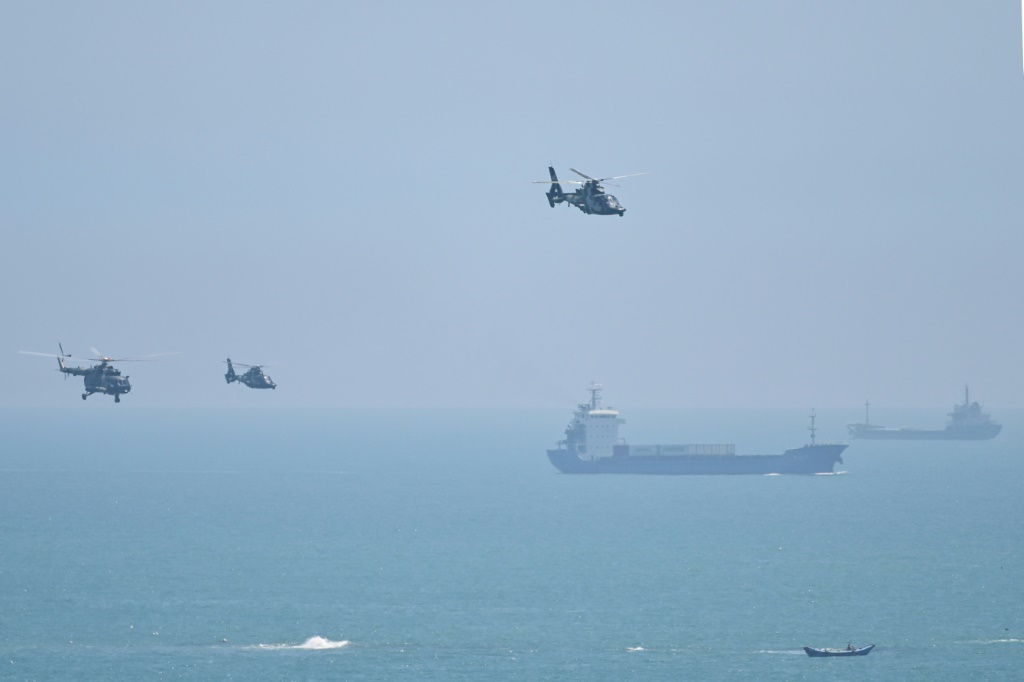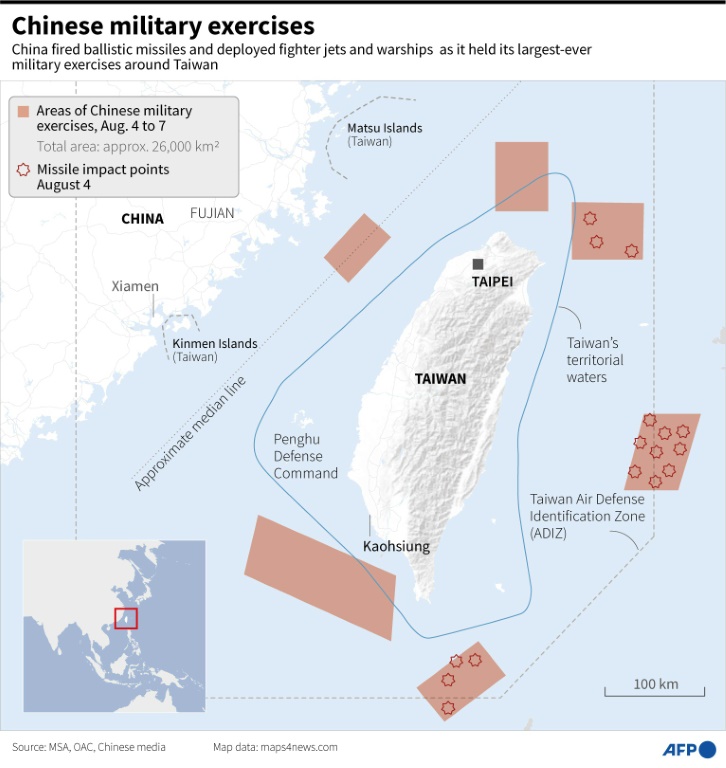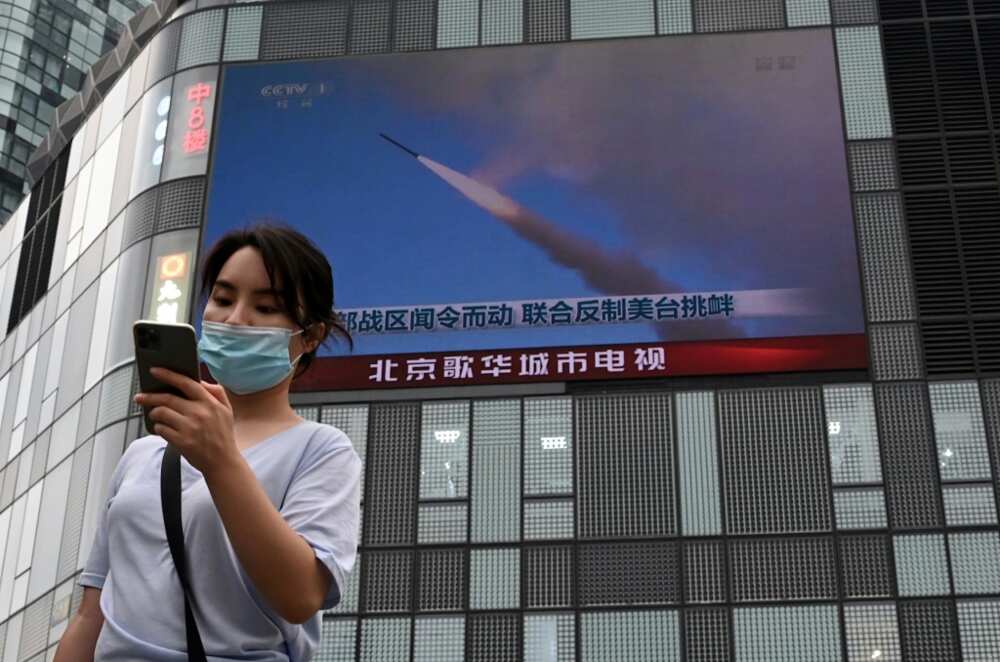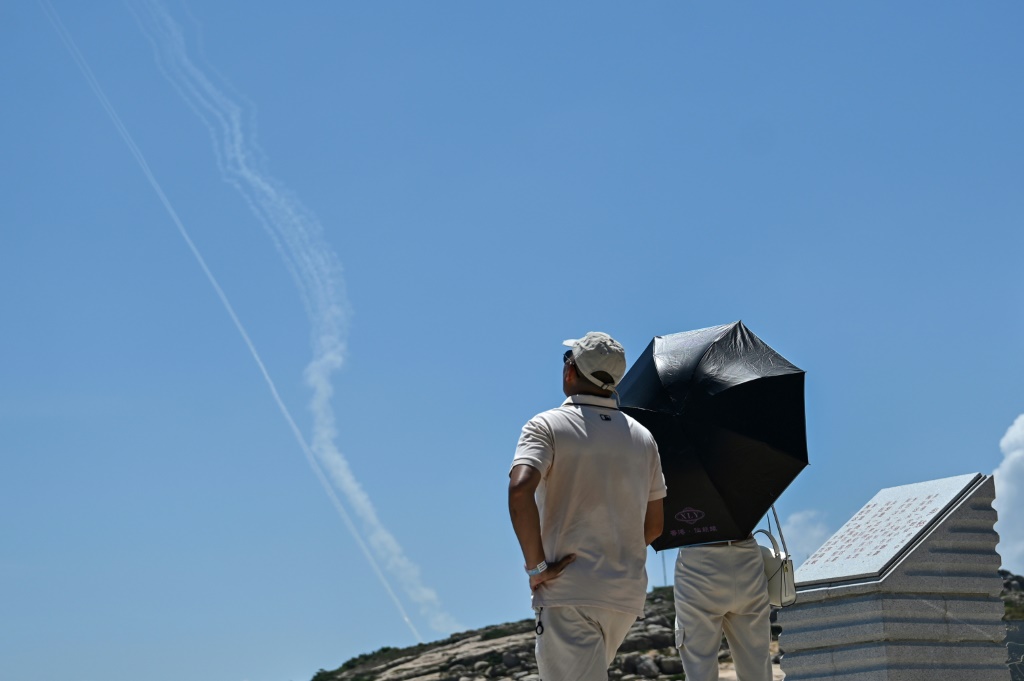China to hold fresh drills around Taiwan despite US condemnation

Source: AFP
New feature: Check out news exactly for YOU ➡️ find “Recommended for you” block and enjoy!
China was set to press ahead Friday with its largest-ever military exercises encircling Taiwan despite firm statements of condemnation by the United States, Japan and the European Union.
Beijing's decision to fire ballistic missiles and deploy fighter jets around Taiwan saw Washington lambast what it said was a gross overreaction to a visit to the self-ruled, democratic island by US House Speaker Nancy Pelosi.
The US House speaker was the highest-profile US official to go to Taiwan in years and defied stark threats from Beijing, which views the self-ruled island as its territory.
In retaliation, China on Thursday launched a series of exercises in multiple zones around Taiwan, straddling some of the busiest shipping lanes in the world and at some points coming just 20 kilometres (12 miles) from the island's shores.
The drills involved a "conventional missile firepower assault" in waters to the east of Taiwan, the Chinese military said. Beijing has said they will continue until midday Sunday.
Beijing's state-run Xinhua news agency reported the Chinese army "flew more than 100 warplanes including fighters and bombers" during the exercises, as well as "over 10 destroyers and frigates."
PAY ATTENTION: Follow us on Instagram - get the most important news directly in your favourite app!
State broadcaster CCTV reported that Chinese missiles had flown over Taiwan.

Source: AFP
Taiwan said the Chinese military fired 11 Dongfeng-class ballistic missiles "in several batches", while Japan claimed of the nine missiles it had detected, four were "believed to have flown over Taiwan's main island".
Taiwan has said it would not confirm missile flight paths, however.
"Considering the main goal of CCP's (Chinese Communist Party's) launch of missiles is to intimidate us and in order to protect the military's intelligence, surveillance and reconnaissance capabilities, we will not release information such as its flight," the defence ministry said in a statement.
'Temperature's pretty high'
China has defended the drills as just countermeasures in the face of provocations by the United States and its allies in Taiwan, which China views as its own territory and which it has vowed to retake.
But the drills have triggered outrage in the United States and other democracies.
"China has chosen to overreact and use the speaker's visit as a pretext to increase provocative military activity in and around the Taiwan Strait," John Kirby, a White House spokesman, told reporters.
"The temperature's pretty high," but tensions "can come down very easily by just having the Chinese stop these very aggressive military drills," he added.

Source: AFP
Japan has lodged a formal diplomatic complaint against Beijing for the drills, with five of the missiles believed to have landed in its exclusive economic zone.
And Prime Minister Fumio Kishida Friday slammed the drills as a "serious problem that impacts our national security and the safety of our citizens" and called for an "immediate cancellation of the military drills."
While on the final leg of her tour of Asia, Pelosi said in Tokyo Friday that Washington will "not allow" China to isolate Taiwan.
"We have said from the start that our representation here is not about changing the status quo here in Asia, changing the status quo in Taiwan," she added.
But Chinese Foreign Minister Wang Yi said in Phnom Penh, on the sidelines of a regional summit on Thursday, that the "flagrant provocation" by the United States had set an "egregious precedent."
"If it's not corrected and countered, will the principle of non-interference in internal affairs still exist? Will the international law still be upheld?" he said, according to Xinhua.
Trading places
The manoeuvers are taking place along some of the busiest shipping routes on the planet, used to supply vital semiconductors and electronic equipment produced in East Asian factory hubs to global markets.
Taiwan's Maritime and Port Bureau has issued warnings to ships to avoid the areas being used for the Chinese drills.

Source: AFP
The Taiwanese cabinet has also said the drills would disrupt 18 international routes passing through its flight information region (FIR).
Several international airlines have told AFP they will divert flights from airspace around Taiwan island.
"China's planned live-fire exercises are occurring in an incredibly busy waterway," Nick Marro, the Economist Intelligence Unit's lead analyst for global trade, wrote in a note.
"The shutting down of these transport routes -- even temporarily -- has consequences not only for Taiwan, but also trade flows tied to Japan and South Korea."
But markets in Taipei appeared to shrug off the tensions, with the Taiwan Taiex Shipping and Transportation Index, which tracks major shipping and airline stocks, up 2.3 percent early Friday.
And analysts broadly agree that despite all its aggressive posturing, Beijing does not want an active military conflict against the United States and its allies over Taiwan -- just yet.
"The last thing Xi wants is an accidental war ignited," Titus Chen, an associate professor of political science at the National Sun Yat-Sen University in Taiwan, told AFP.
New feature: Check out news exactly for YOU ➡️ find "Recommended for you" block and enjoy!
Source: AFP




